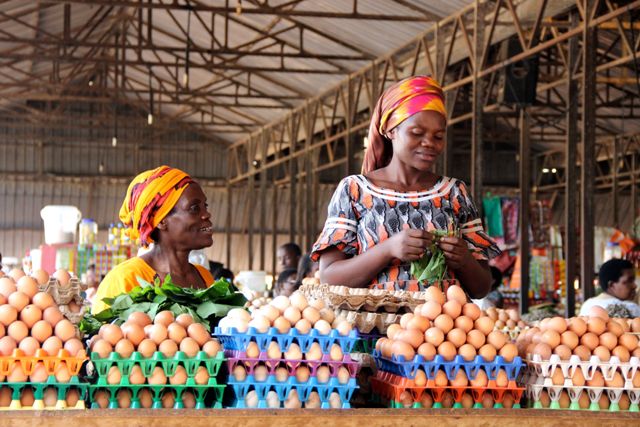Although small and medium businesses (SMEs) account for 95% of all registered businesses and contribute about 50% to the total GDP of sub-Saharan African countries, entrepreneurs still face major obstacles to growth and prosperity. Addressing their needs is essential to creating a prosperous Africa, says Standard Bank.
As more than 40% of SMEs in developing countries still grapple with access to finance, one of the most common barriers facing small businesses, these enterprises also have other significant obstacles to overcome, says Simone Cooper, Head of Business and Commercial Banking at Standard Bank.
“Other critical factors impacting SMEs are onboarding procedures that can be bureaucratic and time-consuming. Then, vetting and financial procedures can place pressure on largely self-funded businesses. This is especially so when SMEs do not have access to the sureties, assets and resources that some financial institutions may require.”
“When it comes to funding, claims that the financial sector generally struggles to understand and serve the needs of SMEs in Africa are unfortunately true. Information asymmetry in financial markets has left many small enterprises knowledge-poor. Lack of collateral or cash flow data means that formal financial service providers often view SMEs as too risky.”
“Many SMEs manage to get their businesses underway, only to fail when cash flow problems occur because short-term payment arrangements and agreements are not in place.”
These fundamental challenges must be added to those of poor infrastructures that isolate small businesses from markets, growth opportunities and capital. SMEs often lack access to high-level skills and specialist staff. Owners, often the most skilled people in small companies, are left to multi-task and assist staff where possible.
The downside of this, says Cooper, is that business owners often find themselves undertaking tasks that are not within their skill sets. Inevitably, outputs are restricted, and tasks, such as administration, are ignored at the cost of the business.
Recognising that small businesses must be assisted with access to funding, markets, skills and resources if Africa is to achieve its desired levels of socio-economic development, Standard Bank has developed a strategic enterprise development approach aimed at supporting SMEs. This approach leverages the bank’s technology, insight and relationship ecosystems to enable African entrepreneurs to overcome the hurdles to business growth on the continent.
Additionally, efforts have included working with equity partner, the Industrial and Commercial Bank of China (ICBC), to showcase African agricultural products at Chinese import promotion events. Two biannual China Africa Export and Trade Exhibition (CAETE) expos saw the signing of a significant 216 projects valued at more than USD 43 billion for new trade with Africa.
Other initiatives include:
- In Uganda, training more than 3,800 entrepreneurs while providing grants in collaboration with various partners, including the Ugandan National Social Security Fund, the Embassy of France and the United Nations Development Programme.
- In Ghana, establishing, with the Ghana Enterprises Agency (GEA), the Standard Bank Incubator, which encourages capacity building and business knowledge sharing).
- In South Africa, introducing the OneFarm Share platform to link marginalised fresh produce producers with mainstream agricultural value chains. This initiative is expected to significantly link Africa’s extensive small farmer segment into regional and even global agricultural value chains.
“Specifically designed financing solutions by the bank to help address the information and administration issues that usually face SMEs seeking funding,” says Cooper. Amongst these initiatives are:
- In Nigeria, SME EZ Cash helps SMEs gather, assemble and present proof of collateral and other required documentation digitally, significantly improving funding outcomes.
- Also, in Nigeria, the bank’s SME Lite provides unsecured working capital solutions for urgent cash flow needs. Over 6 000 loans worth USD 5 million have been disbursed over the last three years.
- The bank’s Enterprise Direct, soon to be introduced across Africa, presently connects South African SMEs to business bankers via 12 call-in hubs. The programme enables entrepreneurs to complete over 90% of routine tasks through the Internet and the Standard Bank mobile App. The bankers that assist business owners are experts at connecting entrepreneurs to capital solutions that suit each business’s needs, ability and repayment abilities.
“It is also essential that women are included in mainstream economic endeavours, and we are certainly always committed to playing a part in supporting platforms or programmes to drive this. To this end, with the United Nations, at least 10,000 women were trained in Nigeria to access agricultural value chains. In South Africa, the Basali Development Programme has empowered about 100 female entrepreneurs to grow their businesses,” says Cooper.
With access to finance continuing to be one of the main concerns keeping SME owners awake at night, addressing SMEs’ short-term funding needs has seen the bank working with South Africa’s provincial governments to develop purchase order solutions that assist SMEs with government contracts to access short-term funding.
“A healthy, expanding small business segment in Africa will increase employment, broaden tax bases, and increase national GDPs, freeing African governments to focus their funding on the social and economic infrastructure key to expanding inclusion and sustaining long-term economic growth on our continent.”
“Helping build SMEs is about building a future in which everybody wins, and this will go a long way towards driving Africa’s growth,” concludes Cooper.

